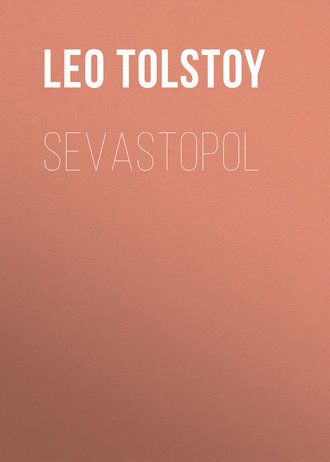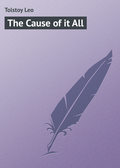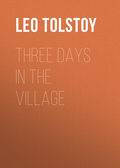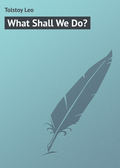
Лев Толстой
Sevastopol
VII
Nikolaeff, who had fortified himself at Duvanka, with two jugs of vodka, purchased from a soldier who was peddling it on the bridge, gave the reins a jerk, and the team jolted away over the stony road, shaded here and there, which led along the Belbek to Sevastopol; but the brothers, whose legs jostled each other, maintained a stubborn silence, although they were thinking of each other every instant.
“Why did he insult me?” thought the younger. “Could he not have held his tongue about that? It is exactly as though he thought that I was a thief; yes, and now he is angry, apparently, so that we have quarrelled for good. And how splendid it would have been for us to be together in Sevastopol. Two brothers, on friendly terms, both fighting the foe! one of them, the elder, though not very cultivated, yet a valiant warrior, and the other younger, but a brave fellow too. In a week's time I would have showed them that I am not such a youngster after all! I shall cease to blush, there will be manliness in my countenance, and, though my moustache is not very large now, it would grow to a good size by that time;” and he felt of the down which was making its appearance round the edges of his mouth. “Perhaps we shall arrive to-day, and get directly into the conflict, my brother and I. He must be obstinate and very brave, one of those who do not say much, but act better than others. I should like to know,” he continued, “whether he is squeezing me against the side of the wagon on purpose or not. He probably is conscious that I feel awkward, and he is pretending not to notice me. We shall arrive to-day,” he went on with his argument, pressing close to the side of the wagon, and fearing to move lest his brother should observe that he was uncomfortable, “and, all at once, we shall go straight to the bastion. We shall both go together, I with my equipments, and my brother with his company. All of a sudden, the French throw themselves on us. I begin to fire, and fire on them. I kill a terrible number; but they still continue to run straight at me. Now, it is impossible to fire any longer, and there is no hope for me; all at once my brother rushes out in front with his sword, and I grasp my gun, and we rush on with the soldiers. The French throw themselves on my brother. I hasten up; I kill one Frenchman, then another, and I save my brother. I am wounded in one arm; I seize my gun with the other, and continue my flight; but my brother is slain by my side by the bullets. I halt for a moment, and gaze at him so sorrowfully; then I straighten myself up and shout: ‘Follow me! We will avenge him! I loved my brother more than any one in the world,’ I shall say, ‘and I have lost him. Let us avenge him! Let us annihilate the foe, or let us all die together there!’ All shout, and fling themselves after me. Then the whole French army makes a sortie, including even Pelissier himself. We all fight; but, at last, I am wounded a second, a third time, and I fall, nearly dead. Then, all rush up to me. Gortchakoff comes up and asks what I would like. I say that I want nothing – except that I may be laid beside my brother; that I wish to die with him. They carry me, and lay me down by the side of my brother's bloody corpse. Then I shall raise myself, and merely say: ‘Yes, you did not understand how to value two men who really loved their father-land; now they have both fallen, – and may God forgive you!’ and I shall die.
Who knows in what measure these dreams will be realized?
“Have you ever been in a hand to hand fight?” he suddenly inquired of his brother, quite forgetting that he had not meant to speak to him.
“No, not once,” answered the elder. “Our regiment has lost two thousand men, all on the works; and I, also, was wounded there. War is not carried on in the least as you fancy, Volodya.”
The word “Volodya” touched the younger brother. He wanted to come to an explanation with his brother, who had not the least idea that he had offended Volodya.
“You are not angry with me, Misha?” he said, after a momentary silence.
“What about?”
“No, because – because we had such a – nothing.”
“Not in the least,” replied the elder, turning to him, and slapping him on the leg.
“Then forgive me, Misha, if I have wounded you.”
And the younger brother turned aside, in order to hide the tears that suddenly started to his eyes.
VIII
“Is this Sevastopol already?” asked the younger brother, as they ascended the hill.
And before them appeared the bay, with its masts of ships, its shipping, and the sea, with the hostile fleet, in the distance; the white batteries on the shore, the barracks, the aqueducts, the docks and the buildings of the town, and the white and lilac clouds of smoke rising incessantly over the yellow hills, which surrounded the town and stood out against the blue sky, in the rosy rays of the sun, which was reflected by the waves, and sinking towards the horizon of the shadowy sea.
Volodya, without a shudder, gazed upon this terrible place of which he had thought so much; on the contrary, he did so with an æsthetic enjoyment, and a heroic sense of self-satisfaction at the idea that here he was – he would be there in another half-hour, that he would behold that really charmingly original spectacle – and he stared with concentrated attention from that moment until they arrived at the north fortification, at the baggage-train of his brother's regiment, where they were to ascertain with certainty the situations of the regiment and the battery.
The officer in charge of the train lived near the so-called new town (huts built of boards by the sailors' families), in a tent, connecting with a tolerably large shed, constructed out of green oak-boughs, that were not yet entirely withered.
The brothers found the officer seated before a greasy table, upon which stood a glass of cold tea, a tray with vodka, crumbs of dry sturgeon roe, and bread, clad only in a shirt of a dirty yellow hue, and engaged in counting a huge pile of bank-bills on a large abacus.
But before describing the personality of the officer, and his conversation, it is indispensable that we should inspect with more attention the interior of his shed, and become a little acquainted, at least, with his mode of life and his occupations. The new shed, like those built for generals and regimental commanders, was large, closely wattled, and comfortably arranged, with little tables and benches, made of turf. The sides and roof were hung with three rugs, to keep the leaves from showering down, and, though extremely ugly, they were new, and certainly costly.
Upon the iron bed, which stood beneath the principal rug, with a young amazon depicted on it, lay a plush coverlet, of a brilliant crimson, a torn and dirty pillow, and a raccoon cloak. On the table stood a mirror, in a silver frame, a silver brush, frightfully dirty, a broken horn comb, full of greasy hair, a silver candlestick, a bottle of liqueur, with a huge gold and red label, a gold watch, with a portrait of Peter I., two gold pens, a small box, containing pills of some sort, a crust of bread, and some old, castaway cards, and there were bottles, both full and empty, under the bed.
This officer had charge of the commissariat of the regiment and the fodder of the horses. With him lived his great friend, the commissioner who had charge of the operations.
At the moment when the brothers entered, the latter was asleep in the booth, and the commissary officer was making up his accounts of the government money, in anticipation of the end of the month. The commissary officer had a very comely and warlike exterior. His stature was tall, his moustache huge, and he possessed a respectable amount of plumpness. The only disagreeable points about him were a certain perspiration and puffiness of the whole face, which almost concealed his small gray eyes (as though he was filled up with porter), and an excessive lack of cleanliness, from his thin, greasy hair to his big, bare feet, thrust into some sort of ermine slippers.
“Money, money!” said Kozeltzoff number one, entering the shed, and fixing his eyes, with involuntary greed, upon the pile of bank-notes. “You might lend me half of that, Vasíly Mikhaïlitch!”
The commissary officer cringed at the sight of his visitors, and, sweeping up his money, he bowed to them without rising.
“Oh, if it only belonged to me! It's government money, my dear fellow. And who is this you have with you?” said he, thrusting the money into a coffer which stood beside him, and staring at Volodya.
“This is my brother, who has just come from the military academy. We have both come to learn from you where our regiment is stationed.”
“Sit down, gentlemen,” said the officer, rising, and going into the shed, without paying any heed to his guests. “Won't you have something to drink? Some porter, for instance?” said he.
“Don't put yourself out, Vasíly Mikhaïlitch.”
Volodya was impressed by the size of the commissary officer, by his carelessness of manner, and by the respect with which his brother addressed him.
“It must be that this is one of their very fine officers, whom every one respects. Really, he is simple, but hospitable and brave,” he thought, seating himself in a timid and modest manner on the sofa.
“Where is our regiment stationed, then?” called out his elder brother into the board hut.
“What?”
He repeated his query.
“Zeifer has been here to-day. He told me that they had removed to the fifth bastion.”
“Is that true?”
“If I say so, it must be true; but the deuce only knows anyway! He would think nothing of telling a lie. Won't you have some porter?” said the commissary officer, still from the tent.
“I will if you please,” said Kozeltzoff.
“And will you have a drink, Osip Ignatievitch?” went on the voice in the tent, apparently addressing the sleeping commissioner. “You have slept enough; it's five o'clock.”
“Why do you worry me? I am not asleep,” answered a shrill, languid little voice.
“Come, get up! we find it stupid without you.”
And the commissary officer came out to his guests.
“Fetch some Simferopol porter!” he shouted.
A servant entered the booth, with a haughty expression of countenance, as it seemed to Volodya, and, having jostled Volodya, he drew forth the porter from beneath the bench.
The bottle of porter was soon emptied, and the conversation had proceeded in the same style for rather a long time when the flap of the tent flew open and out stepped a short, fresh-colored man, in a blue dressing-gown with tassels, in a cap with a red rim and a cockade. At the moment of his appearance, he was smoothing his small black moustache, and, with his gaze fixed on the rugs, he replied to the greetings of the officer with a barely perceptible movement of the shoulders.
“I will drink a small glassful too!” said he, seating himself by the table. “What is this, have you come from Petersburg, young man?” he said, turning courteously to Volodya.
“Yes, sir, I am on my way to Sevastopol.”
“Did you make the application yourself?”
“Yes, sir.”
“What queer tastes you have, gentlemen! I do not understand it!” continued the commissioner. “It strikes me that I should be ready just now to travel on foot to Petersburg, if I could get away. By Heavens, I am tired of this cursed life!”
“What is there about it that does not suit you?” said the elder Kozeltzoff, turning to him. “You're the very last person to complain of life here!”
The commissioner cast a look upon him, and then turned away.
“This danger, these privations, it is impossible to get anything here,” he continued, addressing Volodya. “And why you should take such a freak, gentlemen, I really cannot understand. If there were any advantages to be derived from it, but there is nothing of the sort. It would be a nice thing, now, wouldn't it, if you, at your age, were to be left a cripple for life!”
“Some need the money, and some serve for honor's sake!” said the elder Kozeltzoff, in a tone of vexation, joining the discussion once more.
“What's the good of honor, when there's nothing to eat!” said the commissioner with a scornful laugh, turning to the commissary, who also laughed at this. “Give us something from ‘Lucia’; we will listen,” he said, pointing to the music-box. “I love it.”
“Well, is that Vasíly Mikhaïlitch a fine man?” Volodya asked his brother when they emerged, at dusk, from the booth, and pursued their way to Sevastopol.
“Not at all; but such a niggard that it is a perfect terror! And I can't bear the sight of that commissioner, and I shall give him a thrashing one of these days.”
IX
Volodya was not precisely out of sorts when, nearly at nightfall, they reached the great bridge over the bay, but he felt a certain heaviness at his heart. All that he had heard and seen was so little in consonance with the impressions which had recently passed away; the huge, light examination hall, with its polished floor, the kind and merry voices and laughter of his comrades, the new uniform, his beloved tsar, whom he had been accustomed to see for the last seven years, and who, when he took leave of them, had called them his children, with tears in his eyes, – and everything that he had seen so little resembled his very beautiful, rainbow-hued, magnificent dreams.
“Well, here we are at last!” said the elder brother, when they arrived at the Mikhaïlovsky battery, and dismounted from their cart. “If they let us pass the bridge, we will go directly to the Nikolaevsky barracks. You stay there until morning, and I will go to the regiment and find out where your battery is stationed, and to-morrow I will come for you.”
“But why? It would be better if we both went together,” said Volodya; “I will go to the bastion with you. It won't make any difference; I shall have to get used to it. If you go, then I can too.”
“Better not go.”
“No, if you please; I do know, at least, that…”
“My advice is, not to go; but if you choose…”
The sky was clear and dark; the stars, and the fires of the bombs in incessant movement and discharges, were gleaming brilliantly through the gloom. The large white building of the battery, and the beginning of the bridge stood out in the darkness. Literally, every second several discharges of artillery and explosions, following each other in quick succession or occurring simultaneously, shook the air with increasing thunder and distinctness. Through this roar, and as though repeating it, the melancholy dash of the waves was audible. A faint breeze was drawing in from the sea, and the air was heavy with moisture. The brothers stepped upon the bridge. A soldier struck his gun awkwardly against his arm, and shouted: —
“Who goes there?”
“A soldier.”
“The orders are not to let any one pass!”
“What of that! We have business! We must pass!”
“Ask the officer.”
The officer, who was drowsing as he sat on an anchor, rose up and gave the order to let them pass.
“You can go that way, but not this. Where are you driving to, all in a heap!” he cried to the transport wagons piled high with gabions, which had clustered about the entrance.
As they descended to the first pontoon, the brothers encountered soldiers who were coming thence, and talking loudly.
“If he has received his ammunition money, then he has squared his accounts in full – that's what it is!”
“Eh, brothers!” said another voice, “when you get over on the Severnaya you will see the world, by heavens! The air is entirely different.”
“You may say more!” said the first speaker. “A cursed shell flew in there the other day, and it tore the legs off of two sailors, so that…”
The brothers traversed the first pontoon, while waiting for the wagon, and halted on the second, which was already flooded with water in parts. The breeze, which had seemed weak inland, was very powerful here, and came in gusts; the bridge swayed to and fro, and the waves, beating noisily against the beams, and tearing at the cables and anchors, flooded the planks. At the right the gloomily hostile sea roared and darkled, as it lay separated by an interminable level black line from the starry horizon, which was light gray in its gleam; lights flashed afar on the enemy's fleet; on the left towered the black masts of one of our vessels, and the waves could be heard as they beat against her hull; a steamer was visible, as it moved noisily and swiftly from the Severnaya.
The flash of a bomb, as it burst near it, illuminated for a moment the lofty heaps of gabions on the deck, two men who were standing on it, and the white foam and the spurts of greenish waves, as the steamer ploughed through them. On the edge of the bridge, with his legs dangling in the water, sat a man in his shirt-sleeves, who was repairing something connected with the bridge. In front, over Sevastopol, floated the same fires, and the terrible sounds grew louder and louder. A wave rolled in from the sea, flowed over the right side of the bridge, and wet Volodya's feet; two soldiers passed them, dragging their feet through the water. Something suddenly burst with a crash and lighted up the bridge ahead of them, the wagon driving over it, and a man on horseback. The splinters fell into the waves with a hiss, and sent up the water in splashes.
“Ah, Mikhaïlo Semyónitch!” said the rider, stopping, reining in his horse in front of the elder Kozeltzoff, “have you fully recovered already?”
“As you see. Whither is God taking you?”
“To the Severnaya, for cartridges; I am on my way to the adjutant of the regiment … we expect an assault to-morrow, at any hour.”
“And where is Martzoff?”
“He lost a leg yesterday; he was in the town, asleep in his room… Perhaps you know it?”
“The regiment is in the fifth bastion, isn't it?”
“Yes; it has taken the place of the M – regiment. Go to the field-hospital; some of our men are there, and they will show you the way.”
“Well, and are my quarters on the Morskaya still intact?”
“Why, my good fellow, they were smashed to bits long ago by the bombs. You will not recognize Sevastopol now; there's not a single woman there now, nor any inns nor music; the last establishment took its departure yesterday. It has become horribly dismal there now… Farewell!”
And the officer rode on his way at a trot.
All at once, Volodya became terribly frightened; it seemed to him as though a cannon-ball or a splinter of bomb would fly in their direction, and strike him directly on the head. This damp darkness, all these sounds, especially the angry splashing of the waves, seemed to be saying to him that he ought not to go any farther, that nothing good awaited him yonder, that he would never again set foot on the ground upon this side of the bay, that he must turn about at once, and flee somewhere or other, as far as possible from this terrible haunt of death. “But perhaps it is too late now, everything is settled,” thought he, trembling partly at this thought and partly because the water had soaked through his boots and wet his feet.
Volodya heaved a deep sigh, and went a little apart from his brother.
“Lord, will they kill me – me in particular? Lord, have mercy on me!” said he, in a whisper, and he crossed himself.
“Come, Volodya, let us go on!” said the elder brother, when their little cart had driven upon the bridge. “Did you see that bomb?”
On the bridge, the brothers met wagons filled with the wounded, with gabions, and one loaded with furniture, which was driven by a woman. On the further side no one detained them.
Clinging instinctively to the walls of the Nikolaevsky battery, the brothers listened in silence to the noise of the bombs, exploding overhead, and to the roar of the fragments, showering down from above, and came to that spot in the battery where the image was. There they learned that the fifth light battery, to which Volodya had been assigned, was stationed on the Korabelnaya, and they decided that he should go, in spite of the danger, and pass the night with the elder in the fifth bastion, and that he should from there join his battery the next day. They turned into the corridor, stepping over the legs of the sleeping soldiers, who were lying all along the walls of the battery, and at last they arrived at the place where the wounded were attended to.







